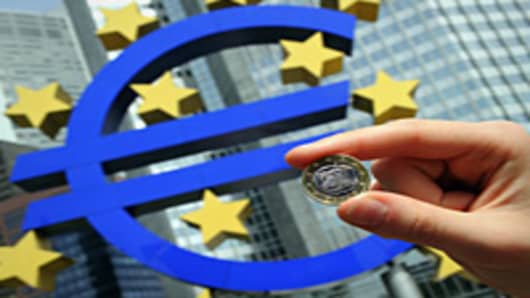The euro is expected to stay under pressure for the rest of the year, with one analyst expecting a further 7 percent decline against the U.S. dollar.
"By year end we think euro-dollar will be at 1.30," Gareth Berry, Currency Strategist at UBS Investment Bank told CNBC on Wednesday, citing concerns over Europe’s debt crisis.
"Obviously events inside the euro zone will have a significant bearing on where we go," he said.
The single currency inched higher against the greenback on Wednesday, rising 0.1 percent to $1.4168, recovering from an earlier fall as German chancellor Angela Merkel tempered hopes for a grand solution to Europe's debt crisis.
According to Berry, a positive outcome from the Euro zone summit on Thursday could boost the currency, and investors should take the opportunity to re-enter euro shorts.
"I'm not expecting a magic bullet at all but it is likely we will see some kind of incremental progress towards a solution and that should be beneficial to the euro," he said, adding that as a short term trade, he would sell the euro-swiss cross shortly after the EU summit.
In addition, a potential normalization of monetary policy from the Federal Reserve is likely to keep the downward pressure on the euro.
"The Fed may be inclined to start sounding a little bit more hawkish towards the end of the year," Berry said. He expects the U.S. central bank to start shrinking its balance sheet in the coming months.
"That could be the first significant sign that the Fed is starting the process of policy and normalization," he added.
Despite uncertainty surrounding America's fiscal situation, there were signs that the U.S. economy was gaining some traction, as June housing starts jumped to their highest level in 6 months. Analysts are expecting further upbeat data as the economy strengthens, which could give Fed policymakers the confidence to start bringing interest rates up from rock-bottom levels.
These events, Berry notes, would be positive for the dollar, and negative for the euro.


